As a recruiter or hiring manager, finding the right Android developer for your team can be a challenging task. Companies need Android developers who not only possess strong technical skills but also fit well within the company culture and can contribute to achieving business goals through innovative mobile solutions. However, many hiring processes fall short by not effectively evaluating candidates' skills and cultural fit, leading to suboptimal hires.
In this article, we provide a structured guide to hiring Android developers, covering everything from resume screening to interviewing. You'll learn how to effectively screen Android developer resumes, implement skills tests, conduct case study assignments, and structure the interview stages. Additionally, we will discuss the various ranks of Android developers and how to hire the best talent for your team. Check out our comprehensive resources for more insights on hiring strategies.
Table of contents
Android Developer Hiring Process
The Android Developer hiring process typically spans 4-6 weeks. Here's a quick overview of the timeline:
- Post a well-crafted job description on relevant job boards
- Review resumes and applications (1-2 weeks)
- Conduct initial screening calls (3-5 days)
- Administer Android skills assessment tests (3-5 days)
- Conduct technical interviews (1-2 weeks)
- Perform reference checks (2-3 days)
- Extend job offer (1-2 days)
This process allows you to thoroughly evaluate candidates' Android development skills and cultural fit. In the following sections, we'll dive deeper into each step, providing you with actionable tips and resources to streamline your hiring process.
Skills and qualifications for an Android Developer
When building a candidate profile for an Android Developer, it's important to distinguish between must-have skills and nice-to-have extras. The mobile app landscape evolves quickly, so what's essential for one project might be optional for another. Let's break down the key skills and qualifications to look for in your next Android hire.
Required skills typically include proficiency in Java and the Android SDK, experience with Android Studio and Gradle, and a solid understanding of Android UI design principles. Knowledge of RESTful APIs, JSON, and version control systems like Git are also fundamental.
Preferred qualifications often encompass experience with Kotlin, familiarity with Android Jetpack components, and knowledge of reactive programming. Understanding of CI/CD pipelines for mobile apps and experience with testing frameworks can also set candidates apart. Remember, assessing these skills effectively is crucial for making the right hire.
| Required skills and qualifications | Preferred skills and qualifications |
|---|---|
| Proficiency in Java and Android SDK | Experience with Kotlin programming language |
| Experience with Android Studio and Gradle | Knowledge of Android Jetpack components |
| Knowledge of Android UI design principles and patterns | Familiarity with reactive programming (e.g., RxJava) |
| Understanding of RESTful APIs and JSON | Understanding of CI/CD pipelines for mobile apps |
| Familiarity with version control systems (e.g., Git) | Experience with unit testing and UI testing frameworks |
How to Write an Android Developer Job Description
Once you have a candidate profile ready, the next step is to capture that information in a job description to attract the right candidates. A well-crafted job description will set clear expectations and entice top Android developers to apply.
- Highlight key responsibilities and impact: Clearly define the Android developer's role, including tasks like developing applications, ensuring high performance, and collaborating with cross-functional teams. Emphasize the impact of their work on your organization's success.
- Balance technical skills with industry expertise: While proficiency in Java, Kotlin, and Android SDKs is important, don't overlook the relevance of soft skills such as problem-solving and teamwork. Consider certifications and experience with popular frameworks relevant to your needs. More details can be found in an Android developer job description.
- Showcase unique selling points: Highlight what makes your company and the role attractive, such as innovative projects or a supportive work environment. This will help distinguish your job listing from others and appeal to top talent.
10 Platforms to Hire Android Developers
Now that you have a job description ready for your Android developer position, the next step is to make it visible on job listing sites to attract potential candidates. Utilizing the right platforms is key to reaching the right talent pool and ensuring a smoother hiring process.
LinkedIn Jobs
Ideal for finding full-time Android developers with established professional networks. Offers detailed profiles and easy application process.

Indeed
Large job board with a wide range of Android developer positions. Good for posting jobs and reaching a broad audience of candidates.

Glassdoor Jobs
Offers job listings along with company reviews, giving insight into work culture for potential Android developer hires.
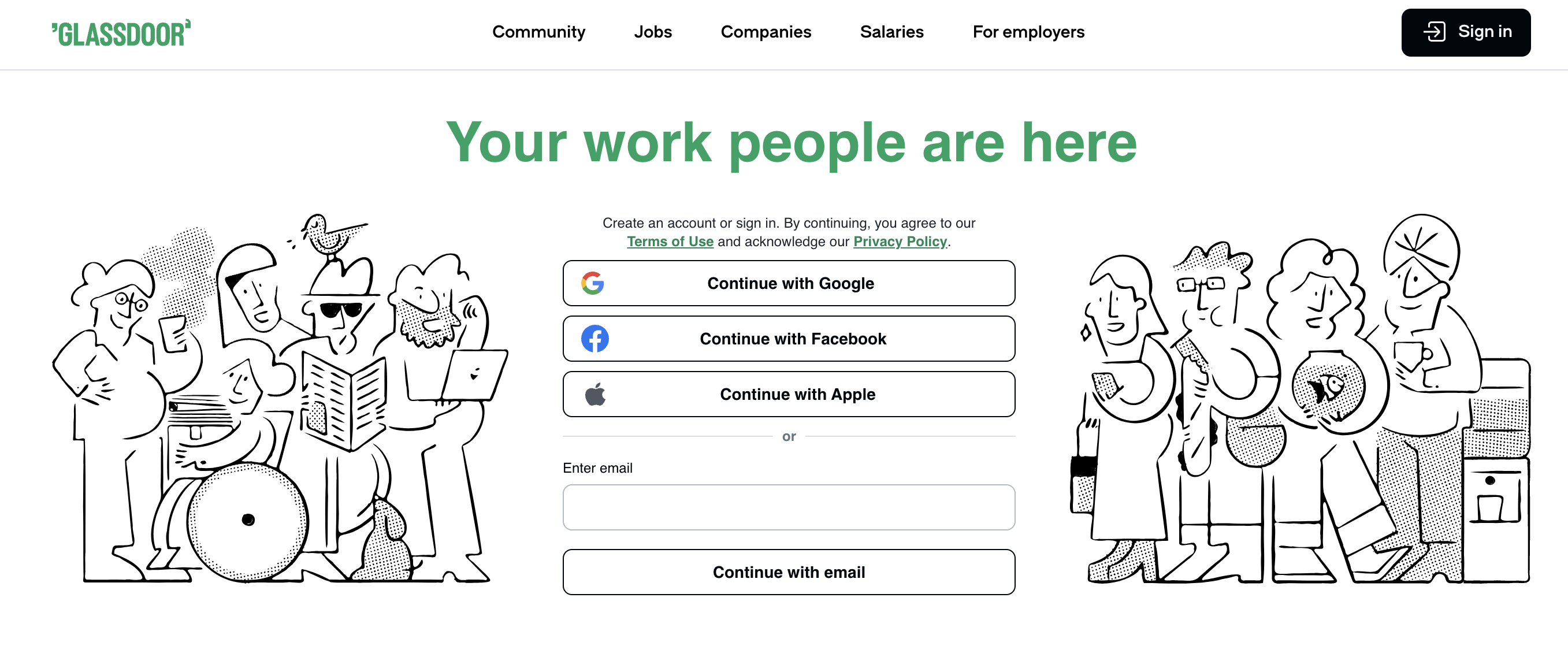
In addition to the popular LinkedIn Jobs, Indeed, and Glassdoor Jobs, there are seven other platforms that can help you find the perfect Android developer. Dice is a tech-focused job board ideal for specialized hires. Upwork and Toptal cater to companies seeking freelance developers, with Toptal offering top-tier talent through a rigorous vetting process. AngelList appeals to those interested in startup environments, while Stack Overflow Jobs and GitHub Jobs provide access to developers engaged in the programming community. If you’re considering remote options, FlexJobs is a great choice for flexible work arrangements. For more insights into how these platforms fit into your hiring strategy, explore our remote hiring guide.
How to Screen Android Developer Resumes?
In today's competitive job market, resume screening is a key step to identify suitable candidates for Android Developer positions from a large pool of applicants. It helps narrow down the list to those who meet your basic requirements, ensuring you focus your interview efforts on the best matches.
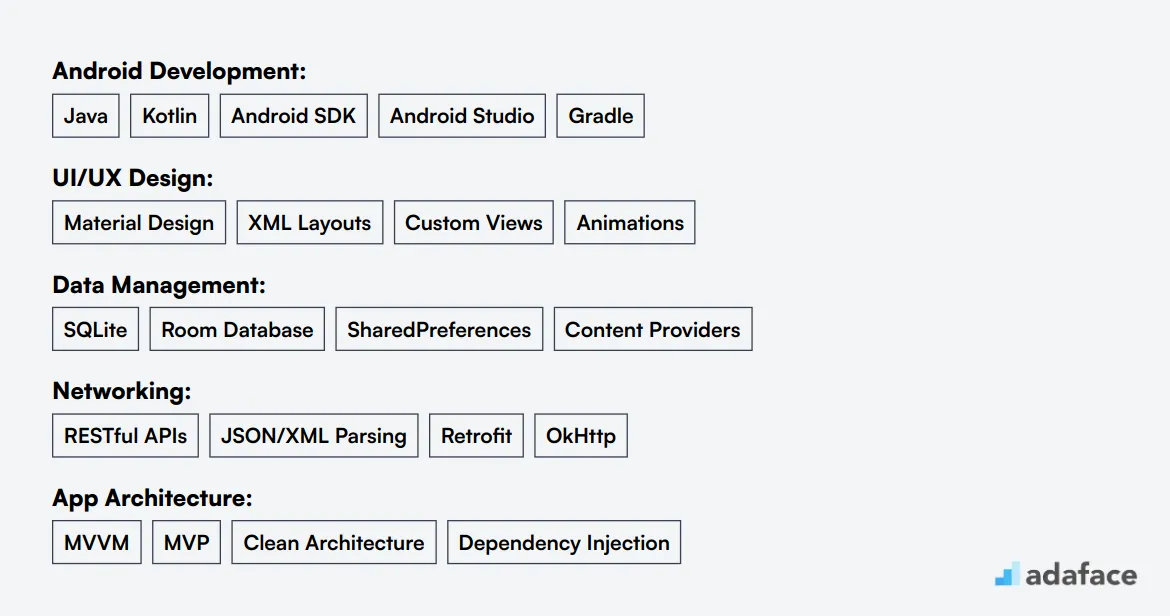
For manual screening, it's important to look for specific keywords that align with the desired skills and qualifications. Some keywords to watch for in Android Developer resumes include Java, Android SDK, Android Studio, and RESTful APIs. These terms indicate the candidate's proficiency in necessary technical skills. For a more detailed list of Android Developer skills, you might find this resource helpful.
Alternatively, you can utilize AI-powered tools to streamline resume screening. These tools can efficiently match keywords and highlight candidates who fit your criteria. By inputting your desired skill set into an AI system, you can save time and focus on interviewing top candidates.
Here's an example prompt you could use with AI to screen for Android Developers:
TASK: Screen resumes to match job description for Android Developer role
INPUT: Resumes
OUTPUT: For each resume, provide following information:
- Email id
- Name
- Matching keywords
- Score (out of 10 based on keywords matched)
- Recommendation (detailed recommendation of whether to shortlist this candidate or not)
- Shortlist (Yes, No or Maybe)
RULES:
- If you are unsure about a candidate's fit, put the candidate as Maybe instead of No
- Keep recommendation crisp and to the point.
KEYWORDS DATA:
- Java (Android SDK, Gradle)
- UI Design (Material Design, XML Layouts)
- Networking (RESTful APIs, JSON)
For comprehensive support in automating your hiring process, consider using an online assessment platform to further evaluate candidates.
Recommended Skills Tests to Screen Android Developers
Screening Android developers using skills tests ensures you hire candidates who are capable and fit the role requirements. By evaluating their practical abilities, you can make informed decisions and streamline your hiring process. Here are some recommended tests to effectively assess Android developers:
Android Online Test: This test helps you evaluate candidates' understanding of Android development concepts, including UI design and performance optimization. It's designed to measure skills relevant to creating functional and user-friendly Android applications.
Kotlin Online Test: With Kotlin being a preferred language for Android development, this test assesses candidates' ability to write clean and maintainable code using Kotlin. It's important for ensuring they can leverage modern language features in your projects.
Java Android Test: Many Android applications still rely on Java. This test focuses on candidates' proficiency in Java as it pertains to building Android apps, ensuring they can handle legacy codebases or work in environments where Java is predominant.
Git Test: Version control is indispensable in collaborative development environments. The Git Test evaluates candidates' skills in using Git, which is crucial for managing code changes and working as part of a team.
UI/UX Design Test: While primarily developers, understanding basic UI/UX principles can enhance how developers create apps. This test lets you see if candidates can design intuitive interfaces that improve user experience.
Case Study Assignments to Hire Android Developers
Case study assignments can be valuable for assessing Android developers' skills. However, they come with drawbacks like lengthy completion times, low participation rates, and the risk of losing good candidates. Despite these challenges, well-designed case studies can provide insights into a candidate's problem-solving abilities and coding practices.
Android App Redesign: This case study involves redesigning an existing Android app to improve its user interface and functionality. Candidates are asked to analyze the current app, propose improvements, and implement key changes. This assignment tests UI/UX skills, Android SDK knowledge, and the ability to work with existing codebases.
Custom Android Widget Creation: In this assignment, developers are tasked with creating a custom Android widget from scratch. The widget should display real-time data and be configurable by users. This case study evaluates a candidate's proficiency in Android development fundamentals, including layout design, data management, and user interaction.
Android Performance Optimization: Candidates are given a poorly optimized Android app and asked to identify and fix performance issues. This case study assesses a developer's ability to profile Android applications, optimize resource usage, and implement best practices for smooth app performance.
Structuring the Interview Stage for Hiring Android Developers
Once candidates pass the skills tests, it's time to move them to the technical interview stage where their hard skills are further evaluated. Skills tests are effective in filtering out unfit candidates but aren't always the best at identifying the most suitable ones for a role. In the technical interview stage, asking the right questions is crucial for understanding a candidate's depth of knowledge and ability to apply it practically.
Consider asking questions like: 'Explain the Android activity lifecycle and its importance' to gauge their understanding of fundamental Android concepts. 'How do you manage app memory effectively?' is useful to assess problem-solving in resource management. 'Describe how you would handle API data parsing' can reveal their proficiency with REST APIs. 'What is the difference between a Service and an IntentService?' helps in understanding their grasp on background operations. Lastly, 'How do you implement unit testing in Android applications?' assesses their focus on code quality and reliability.
How much does it cost to hire an Android Developer?
Hiring an Android Developer can be a significant investment depending on where you are located. In the United States, salaries average around $126,870, with a range from $77,217 to $185,461. In Canada, the average salary is around CAD 106,877, but it varies widely across cities. Understanding these rates helps in planning your budget effectively.
Android Developer Salary in the United States
The average salary for an Android Developer in the United States is approximately $126,870. Salaries can range from around $77,217 at the lower end to about $185,461 for more experienced roles. Location significantly impacts earnings, with cities like San Francisco and New York offering top-tier salaries.
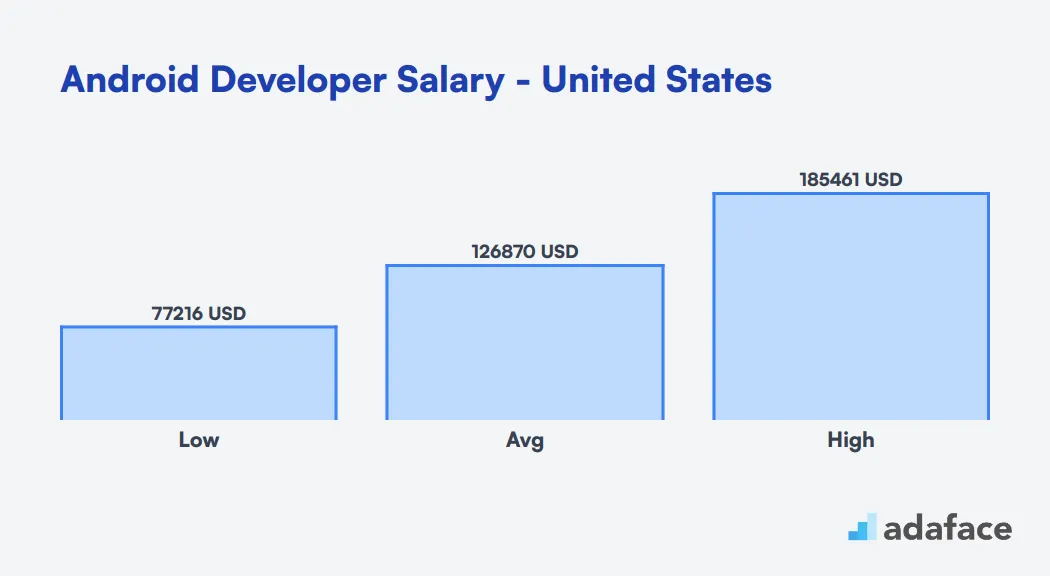
Android Developer Salary in the United Kingdom
Android Developer salaries in the UK vary based on experience and location. In London, the average salary ranges from £35,000 to £75,000 per year. Junior developers typically earn around £25,000 to £35,000, while senior developers can command £60,000 to £90,000 or more.
Factors affecting salary include skills in Kotlin, Java, and popular frameworks. Developers with expertise in emerging technologies like AR/VR or AI may earn higher salaries. Remember, these figures are estimates and can change based on market conditions and company size.
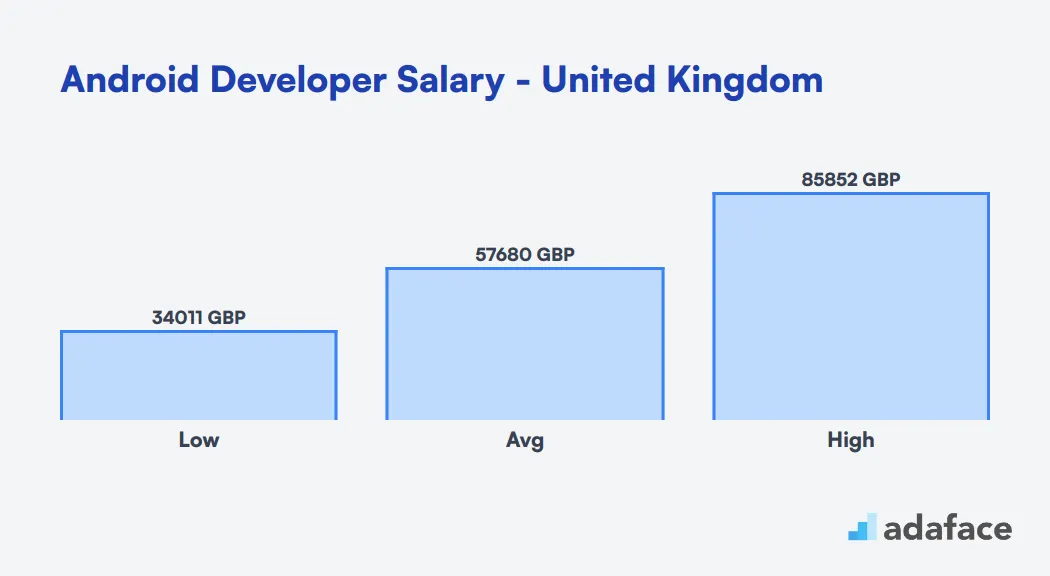
Android Developer Salary in Canada
When it comes to hiring an Android Developer in Canada, understanding the salary range is key. The average salary across Canada is approximately CAD 106,877, with the median hovering around CAD 94,314. However, this can vary significantly based on location. For instance, developers in London, ON have a consistent salary of CAD 150,000, while those in Winnipeg, MB see a range from CAD 43,390 to CAD 72,424. It's important to consider these variations when budgeting for your hiring needs.
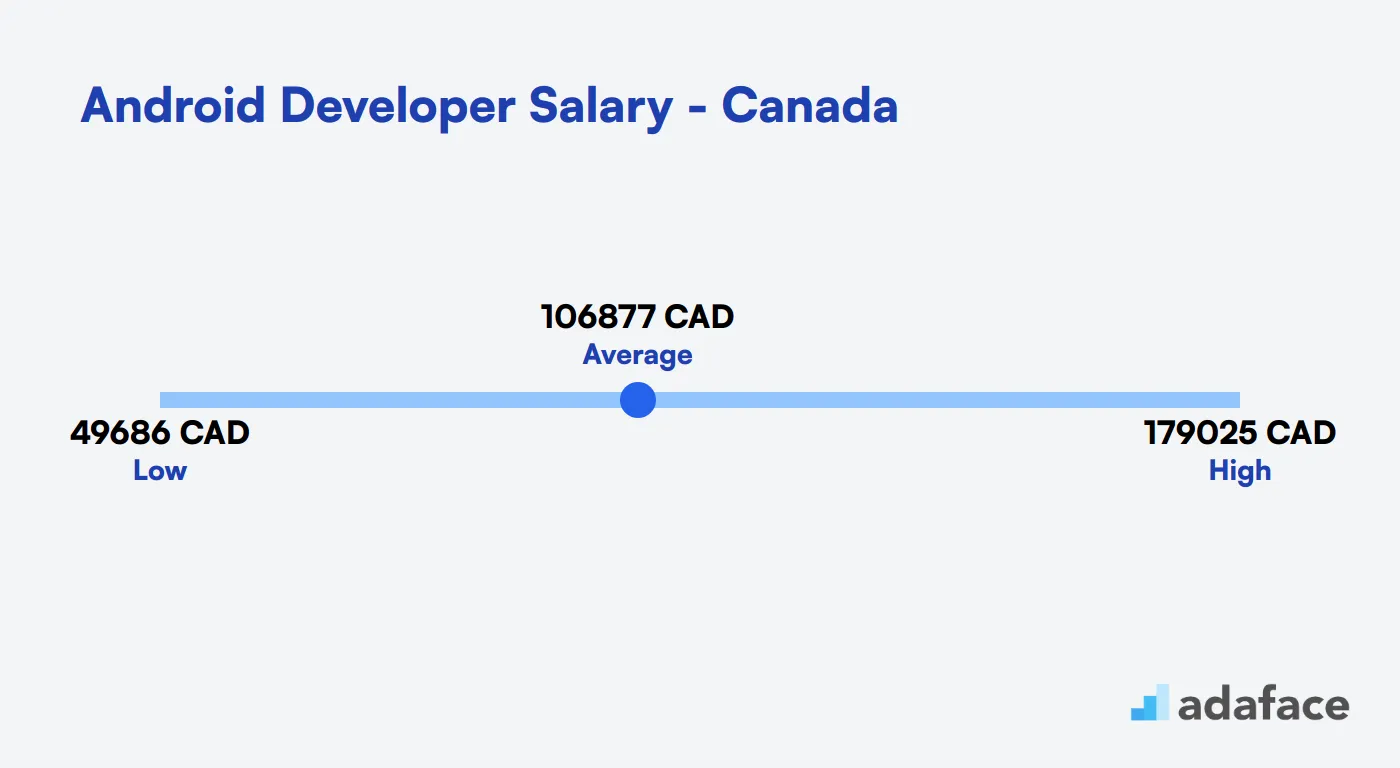
What are the ranks of Android Developers?
When hiring Android developers, it's common to confuse their roles and responsibilities, especially when distinguishing between various levels. Each rank brings different skills and experiences to the table, making it important to understand these distinctions when building your team.
- Junior Android Developer: Entry-level position for developers who are beginning their career in Android development. They typically work under supervision, handling basic tasks and learning the ropes of the development process.
- Mid-Level Android Developer: These developers have a few years of experience and can work independently on projects. They manage more complex tasks and contribute actively to coding and debugging. They're often responsible for portions of project development from start to finish.
- Senior Android Developer: With extensive experience, senior developers lead projects, mentor junior team members, and are involved in architectural decisions. They possess deep knowledge of Android development best practices.
- Lead Android Developer: This role involves overseeing the entire development team and project lifecycle. They set technical standards and ensure the team's output aligns with business goals. They also liaise with other departments to ensure cohesive product development.
Hire the Best Android Developers for Your Team
Throughout this guide, we've explored every aspect of hiring an Android Developer, from understanding the necessary skills and qualifications, to structuring the interview process and evaluating costs. We've also looked at crafting precise job descriptions and selecting the best platforms to find top talent.
If there's one key takeaway for recruiters and hiring managers, it's the importance of using precise job descriptions and relevant skills tests to ensure you hire the best fit for your needs. Consider using assessments like the Android Online Test or the Kotlin Online Test to identify top candidates efficiently.
Android Online Test
FAQs
Look for relevant technical skills, experience in developing Android applications, familiarity with Android SDK, and experience with programming languages like Java and Kotlin. Additionally, consider their past projects and any published apps.
Use a combination of skills assessment tests, such as the Android online test, and take-home assignments to gauge their technical abilities and problem-solving skills.
Focus on both technical and behavioral questions. Technical questions can cover topics like Android architecture, app lifecycle, and problem-solving scenarios. See our interview questions guide for more ideas.
Android developers are typically categorized into junior, mid-level, and senior roles. Each level reflects different experience levels, responsibilities, and expertise in Android development.
Offer competitive compensation, provide opportunities for career growth, and foster a positive work environment. Highlight exciting projects and the impact developers will have. For more tips, visit our resource on attracting technical talent.
Avoid focusing solely on technical skills without considering cultural fit, not conducting thorough interviews, and failing to clearly define the role and responsibilities in the job description.
Structure the interview stages clearly, communicate expectations, and provide candidates with all necessary information beforehand. Preparing a set of standardized questions and tests can also help maintain consistency.

40 min skill tests.
No trick questions.
Accurate shortlisting.
We make it easy for you to find the best candidates in your pipeline with a 40 min skills test.
Try for freeRelated posts
Free resources



